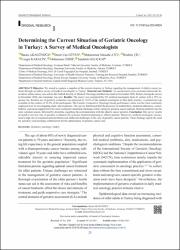Determining the current situation of geriatric oncology in Turkey: A survey of medical oncologists

Göster/
Erişim
info:eu-repo/semantics/openAccessTarih
2021Yazar
Akagündüz, BaranGüven, Deniz Can
Atcı, Muhammed Mustafa
Çil, İbrahim
Karaçin, Cengiz
Özer, Muhammet
Kılıçkap, Saadettin
Üst veri
Tüm öğe kaydını gösterKünye
Akagunduz, B., Guven, D.C., Atci, M.M., Cİl, I., Karacin, C., Ozer, M. & Kiliçkap, S. (2021). Determining the current situation of geriatric oncology in Turkey: A survey of medical oncologists. Journal of Oncological Science, 7(1), 25-30. http://doi.org/10.37047/jos.2020-80824Özet
Objective: We aimed to capture a snapshot of the current situation in Turkey regarding the management of elderly cancer patients through an online survey of medical oncologists in Turkey. Material and Methods: An anonymized cross-sectional nationwide de-scriptive online survey was sent to the Turkish Society of Medical Oncology members by email in November 2020. Before closing the survey in December 2020, one remainder was sent. Results: The survey was completed by 133 medical oncologists from 41 centers with a 29% response rate. Routine use of geriatric evaluation was practiced by 18.2% of the medical oncologists in their daily practice. A geriatrician was available in the centers of 36.8% of the participants. The Eastern Cooperative Oncology Group performance status was the most commonly employed tool for investigating older cancer patients. Our survey determined that the presence of malnutrition, treatment adherence, comor-bidities, and social support were the most commonly identified challenges while caring for geriatric cancer patients. Hearing problem was the most common reason, followed by dementia, regarding the communication with the elderly cancer patients. Conclusion: Our survey results revealed a very low rate of geriatric evaluation for systemic treatment planning in elderly patients. Moreover, medical oncologists encoun-tered a high rate of communication problems and additional challenges in the care of geriatric cancer patients. These findings signify the need for geriatrics and oncology collaboration for the optimization of geriatric cancer care.

















